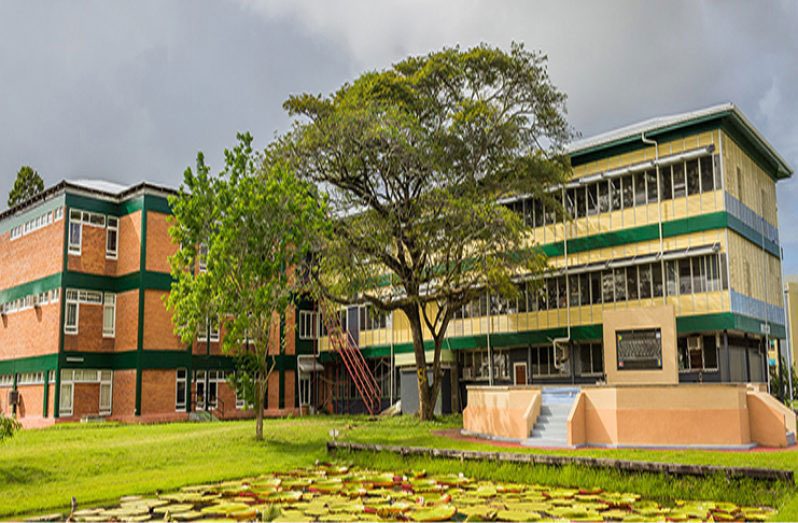IN response to a skills gap within both the public and private sectors, the University of Guyana’s School of Entrepreneurship and Business Innovation (SEBI) has introduced a Masters of Science (MSc) in Supply Chain Management (SCM) programme.
The new programme adds to the list of several new programmes being introduced by the university at both the undergraduate and post-graduate levels for the 2021/2022 Academic Year, a release said.
The carefully crafted MSc in Supply Chain Management programme is intended to address some critical needs within Guyana. SEBI considers this programme of critical importance in fulfilling its mandate to offer programmes relevant to national development.
The programme will be offered online and both local and foreign faculties will be utilised to deliver the curriculum. The programme comprises 42 credits which are to be completed over two years (five semesters). To ensure that students gain more than theoretical exposure to the issues in this programme, they are required to prepare a final project.
This final project is intended to provide them with an opportunity to show their understanding of issues critical to supply chain management and how these can be addressed. For example, how does a mining operation locate and move critical supplies to multiple interior locations, given the current network of roads and rivers?
In a brief comment, the Dean of SEBI, Professor Leyland Lucas said: “Launching the MSc in Supply Chain Management is timely in Guyana. The programme is robust and satisfies the demands of both industry and academia, and has been built around international and regional standards. The programme makes extensive use of simulations to ensure that students receive both theoretical and practical exposure to relevant issues. More importantly, it requires students to examine critical and relevant issues that may impact on SCM decisions, rather than simply focusing on the theoretical issues of the field.”
He added: “Globally, there are significant concerns about the pandemic’s impact on the supply chain for industries. With the pandemic came increased focus on online shopping, and these products must be sourced from somewhere. A recent publication stated that businesses might not be able to carry adequate stocks of products for the holiday season. Clearly, SCM is more than just a mundane issue.”
IMPORTANT ISSUES
Knowing where inputs are being sourced from, the reliability of suppliers, the risk of exposure to flaws in the value chain system, and how best to protect the organisation from such risks are all to be considered, the University of Guyana said.
It added that no longer can trade barriers protect inefficient firms seeking to exploit market opportunities.
“For example, the Revised CARICOM Treaty of Chaguaramas speaks specifically to the establishment of a Single Market Economy (CSME), while acknowledging that some economies and companies operating there might be disadvantaged and need special dispensation. Likewise, the treaty emphasises the need to provide opportunities for judicial and other forms of relief, without violating the intent of the CSME establishment.
These and similar initiatives in more advanced regional bodies have the ability to affect access to the most effective and efficient supply chains to support organisational performance. So, although public and private sector organisations that survive are expected to demonstrate dependability and reliability in the delivery of goods and services, specific accommodations will still be necessary in light of unique regional conditions,” the university noted.
The MSc Supply Chain Management was drafted by a team from the School of Entrepreneurship and Business Innovation (SEBI) under the leadership of Professor Leyland M. Lucas, Dean of SEBI. The core drafters included Teneisha Johnny, Mandie Mickle, and Carol Webster.
SUSTAINABLE TOURISM MANAGEMENT PROGRAMME
SEBI also launched a new Bachelor of Science (BSc) in Sustainable Tourism Management. The new BSc programme in Sustainable Tourism Management has replaced the Bachelor of Arts in Tourism and the Associate of Arts in Tourism Studies.
It is geared towards addressing the growing needs of Guyana and the region by creating a new group of graduates who will possess the competence, knowledge, and practical skills to aid in (1) viewing sustainable tourism as a vital mechanism to the economic development of Guyana, (2) appreciating the imperativeness of balancing tourism, the protection of the physical and social environment and economic development, and (3) respecting the historical importance and knowledge of indigenous communities and valuing their contributions to development.
The programme is scheduled to commence online in late October 2021. It is comprised of 126 credits which are to be completed over four years (eight semesters) and will be offered both online and face-to-face modes.
The programme capitalises on Guyana’s competitive advantage of being the world’s number one ecotourism destination and the uniqueness of Guyana’s tourism resources while satisfying the demands of the industry. It incorporates a strong combination of SEBI’s foundational courses and specialist tourism courses.
Some of these exciting specialist tourism courses include: Eco-Tourism Development; History and Culture Tourism; Indigenous Peoples and Tourism; Community Based Tourism; Facilities & Attraction Management; Facilities & Attraction Management; Tourism Planning & Policy; Tourism Entrepreneurship & Events Management; Eco-Tourism Operations Management; and Marketing Sustainable Tourism.
Persons interested in pursuing one of the programmes being offered by SEBI are kindly asked to use the following link: https://sebi.uog.edu.gy/academic-programmes.
Prospective students can also choose from over 140 programmes including those offered at the Ph.D., masters, undergraduate, associate degree, diploma, and certificate levels. The university has instituted a rolling application process for the first semester of this new academic year.



.jpg)











